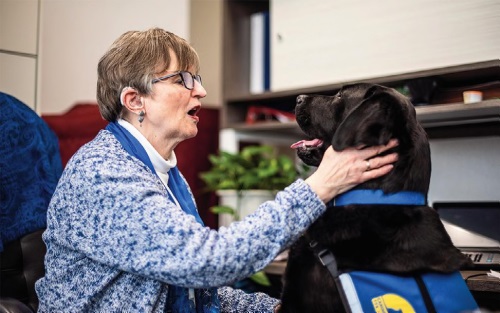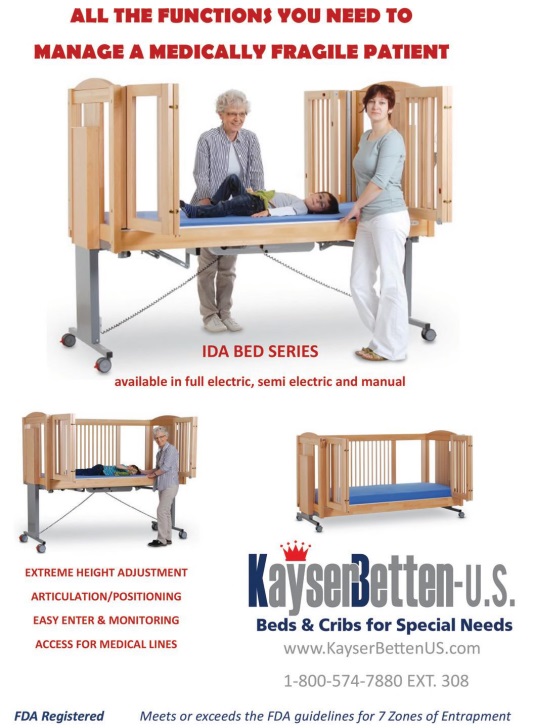ing option. But more than 35% of physicians have no idea what their legal responsibilities are to disabled patients under the ADA, according to a Health Affairs article published in January.
“There’s no ADA police,” Hamlin said. “All the burden is on the consumer.”
Lise Hamlin sits in an office chair, petting her black laborador/golden retriever mix hearing dog, Shine.
Lise Hamlin with her hearing dog, Shine. Hamlin uses captions and lip-reading to better understand video meetings. When she realized her telemedicine appointments wouldn’t have captions, she was enraged, but hesitant to do much about it. “You’re in the middle of a pandemic, how much do you want to alienate your doctor?” she asks. Goel’s doctors broke the law, but they are not being punished or penalized for it. And she doesn’t know whom she would talk to about suing.
Although the technology advancements in Goel’s lifetime – like the free interpretation service used to conduct this interview with her – have given her more independence and connection with others, the pandemic has stripped much of it away, she said. It has limited her ability to use Uber to travel places due to increased cost and pandemic risk, and isolated her at home with her parents. “Instead of growing in independence, it just feels like I’ve gone backwards,” she said.

MIXED SIGNALS: Lise Hamlin with her hearing dog, Shine; Hamlin uses captions and lip-reading to better understand video meetings.
T he accelerating shift toward at-home testing that used to be done in doctors' offices is another growing problem for disabled Americans, said Bryan Bashin, CEO of the LightHouse for the Blind and Visually Impaired in San Francisco.
Take colon cancer screening, he said. Many doctors now recommend patients do a fecal collection at home: Put a portion of one's poop in a test tube, write the date on it, and send it to the lab.
"Let me tell you, I will never subject a friend of mine to help me with this," said Bashin, who is blind. While he was eventually able to schedule a screening appointment with his doctor after talking to his insurance company, it delayed his care.
"Accessibility needs to be part of what we do as a government, as a society," Bashin said. "The ADA says that you don't just have accessibility when things are running normal."
Michelle Hackman, a blind Wall Street Journal reporter in Washington, D.C., tried to get her rapid covid tests reimbursed via her Aetna health care flexible spending account. But Aetna insisted she print out and mail or fax the receipts, even after she called and explained how difficult that would be for her. It then asked her to have someone help her – something Hackman is all too used to hearing.
"That's really the indignity," she said, especially when she didn't want to risk infecting anyone. Eventually, she talked a manager at Aetna into letting her forward her Amazon receipts.
"Imagine going through this for every single receipt I want to submit," she said.
When asked about its response to Hackman’s situation, Aetna spokesperson Ethan Slavin said: “We’re committed to making all of our services accessible to our members and make appropriate accommodations for members with disabilities.” The company then reached back out to Hackman to process her forms. Slavin also sent KHN a medical information release form for Hackman to fill out, which would have allowed the company to discuss her situation. But she would have had to print, write on, and rescan it – the problem she called them about at the start.•
ABOUT THE AUTHOR:
Lauren Weber, KHN Midwest Correspondent, writes about the public health challenges, supply chain scrambles, rural health ramifications, and equity issues associated with the covid-19 pandemic from her hometown of St. Louis. She was a member of the KHN-AP reporting team on the Underfunded and Under Threat project on public health that won a gold AAAS Kavli Science Journalism Award and the Online News Association’s University of Florida Award for Investigative Data Journalism. Formerly a health policy reporter for HuffPost based in Washington, D.C., while there she created “The Morning Email,” a weekday rundown of the news, and was the distinctive voice of HuffPost on Amazon Echo. She was a 2017 USC Annenberg Health Journalism National Fellow.
